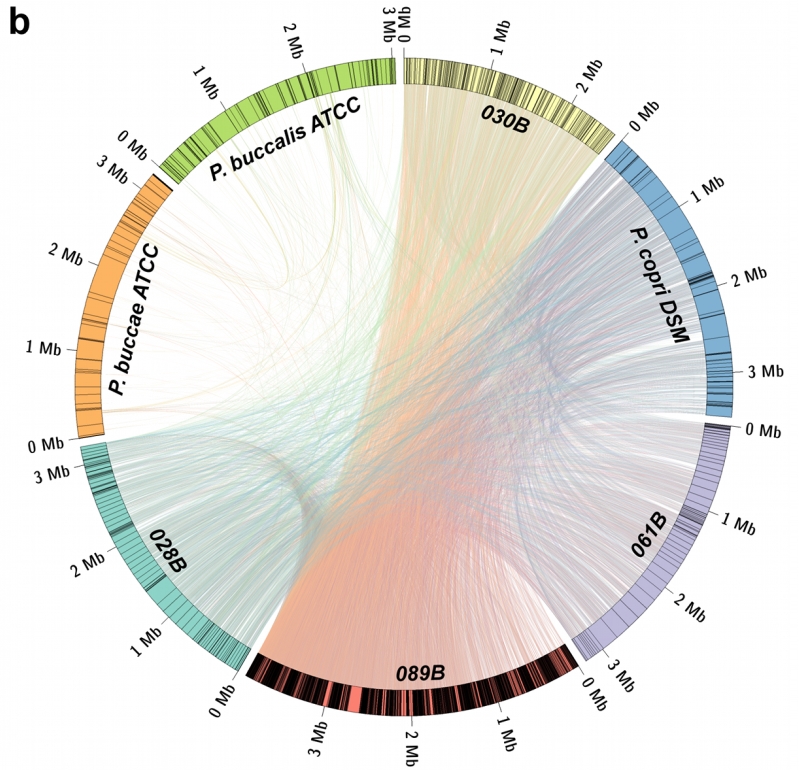A gut feeling about arthritis
Interview with
The gut microbiota of patients with rheumatoid arthritis is enriched in microbes belonging to the Prevotella genus. 
Dan - We found in mice, colonisation of the intestine with a particular bacterium thought normally to be a symbiotic harmless bacterium seem to trigger the onset of an arthritis syndrome that resembles rheumatoid arthritis (RA). And we were just asking whether we might see something similar in humans.
Chris - So, how did you actually approach this study? You took patients who had RA, rheumatoid arthritis, and then went looking to see if there were certain bugs that seem to keep cropping up in those patients.
Dan - Exactly. There's been a tremendous advance in the genomics of the consortia of bacteria that are present at various body surfaces. And advances in sequencing technology over the last five years have made it possible now to basically get a snap shot of the entire microbiome in one take. In our case, we were looking at the microbiota in the faeces and then get this kind of a sequence from each individual. What made our study successful, I believe, was that we had access to patients who had yet to receive any treatment. There were new onset patients who had had symptoms on average for only four to five months, and that's where we saw really the difference. And those people who had yet to be treated, we saw an enormous predisposition to be colonised with Prevotella copri.
Chris - So, this Prevotella organism, you find that it's over represented in this cohort of patients who have rheumatoid arthritis, in terms of its physical presence and the numbers of organisms that are there.
Dan - In terms of both numbers and presence, that's right. Prevotella copri seems to occur in a bimodal distribution in the population, particularly in western countries. And in the number of large scale studies, both in the US, the so-called human microbiome project, the HMP, and in Europe, there's another large study called the metaHIT study. In both of those, it was found that Prevotella is present in roughly 15% of healthy individuals.
Chris - So what do you think it's doing in these people who go on to get rheumatoid arthritis? What is the bug doing?
Dan - It's very difficult for us to know. Whether it goes along for the ride in somebody who's predisposed to rheumatoid arthritis and possibly, the inflammation in the body of these individuals favours the growth of the Prevotella. That's one possibility, but another possibility is the presence of this particular bacterium may actually favour the development of a particular type of inflammatory lymphocyte and that inflammatory lymphocyte may then go on to in some way attack the joints in the body.
Chris - We know also that rheumatoid arthritis runs in families. So, what role could genetics play here?
Dan - We know that there are particular genes that predispose getting rheumatoid arthritis. So, we looked at those particular genes to see if they were present or absent, and what we found to our surprise is that those who had the predisposition genes, actually had a lower level of colonisation with Prevotella. So, there was an inverse correlation. So, one way of interpreting this, is that there needs to be a particular threshold for activation of the immune system in order to trigger the autoimmune disease in rheumatoid arthritis. So, either you have the susceptibility genes, or you have a high level of Prevotella, but only one or the other is needed to trigger the disease.
Chris - So, what do you think it's going to take to nail this? How are we going to get to the bottom of the role that Prevotella might play?
Dan - Well, the important question now is to try to understand whether Prevotella triggers a type of immune response that can lead to increased inflammation in rheumatoid arthritis. And in order to do that, we need to do longitudinal studies in which we track patients who are at risk before they develop disease, and ask whether we can predict the onset of disease by changing their microbiota. In addition, we'll need to ask whether particular types of antibiotic therapies might be able to reduce the risk of disease. The other more mechanistic studies to try to understand whether there are particular types of immune cells that are specifically activated by Prevotella, because that will also give us a hint as to whether the Prevotella is acting through a direct activation of the immune system. And, related to that is the question of whether triggering is by a bacterium like Prevotella is sufficient to set in motion the disease process after which the Prevotella no longer has a role. Patients who have been treated long term, we don't see this increase in levels of Prevotella.










Comments
Add a comment